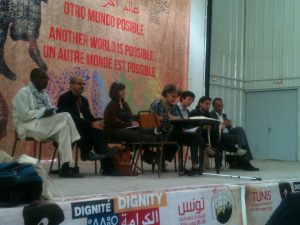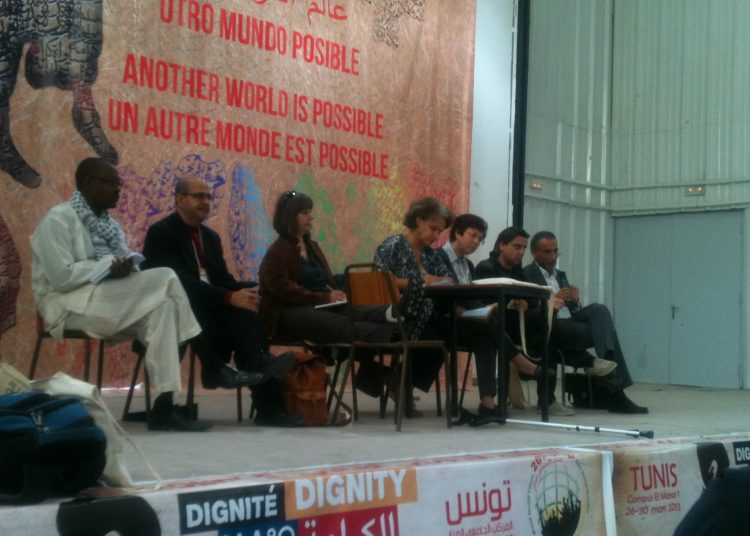By Houda Mzioudet.

Tunis, 6 April, 2013:
“The world is one society. It is possible to become so, with no . . .[restrict]border on planet Earth” stated Bandeq Bandeq, a Libyan Amazigh singer from the city of Zuwara, about the World Social Forum Tunis 2013.
The World Social Forum chose Tunisia’s capital city to host its twelfth session of the most important anti-globalization world event. This year’s edition of the forum kicked off in Tunis on Tuesday, March 26, 2013 and closed off on March 30, 2013 with the participation of over 135 couhtries and around 70,000 participants representing civil society and personalities from the social, political and religious spheres.
Entitled Dignity, the forum wanted to pay tribute to the Arab Spring revolutions with Tunisia being its first spark and at the heart of the struggle that led to the fall of dictatorial regimes in the region. Tunisia is the first country int he Arab world to have hosted this world event of anti-Capitalist members from civil society and activists. The forum was hosted in the Al Manar Campus of the University of Tunis al Manar and its attendant faculties of law, economic and managment studies and engineering.
Born in the Brazilian city of Porto Alegre, where it was first held, the Forum often comes simultaneously with the G8 Summit of the world’s most powerful nations. Participants in the World Social Forum include leftist activists who often criticize the negative effects of “savage Capitalism” and “seek to promote a fairer and more just society for world population”. In 2011, the World Social Forum organising committee decided to hold the forum in Tunis.
Libyans actively participated in the WSF with around 75 participants representing a dozen oragnizations from Libyan civil society. The Libyan association Libue Foundation to Support the Rights and Freedoms, which was founded in 2008, by Libyan young activists in Libya and abroad “to report on human rights abuses and support anyone defending rights by trying to communicate Libyan people’s voices in the four corners of the world.” The organisation got official recognition by the Libyan Ministry of Culture and Civil Society in 2011.
Around 70 Libyan organizations took part in FSM Tunis 2013, including the Libyan Observatory for Human Rights and the Libya Center for Strategic and Future Studies. Libyan participants belong to assocations and organizations that deal with women, children issues but there were also people from the media sector.
” As you should know, we Libyans we entered the world of civil society organizations almost two years ago after the revolution. Before, we were deprived from these things,” Ibtihal Saki, a Libyan Amazigh activist told the Libya Herald.
Rabiaa Madi, from the association Nabadhat for the development of family and child, is from Zuwara. Her organization is a cultural, educational, recreational and social association that cares for women and children’s rights in new Libya. We came here to see how we can benefit from the associations and organizations that are present in this forum,” she explained.
Ali Hamouda from Libue Foundation declared at the end of the forum of the FSM that civil society in Libya will work to host the Maghreb Social Forum in Libya for 2014 “to bring together Maghreb peoples”.
One of the highlights of the forum was the promotion of the rights of refugees in developed countries and the movement of people in a global world, fighting racism and alternative tourism and other economic sectors in developing countries in Africa, Asia and Latin America.
“What I wish is that there will be no borders on planet Earth. I can go anywhere and do whatever I want, “Bondoq concluded.
Participants expressed their overall satisfaction with the organization of the forum in Tunis despite little hiccups regarding logistiscal problems. Tunisian authorities mobilized security, staff including fire fighters and staff from the health sectors to ensure that the forum’s activities went smoothly.
FSM Tunis 2013 came as fruitful realization of the recognition of the struggle led by social movements and civil society in Tunisia in the ousting of Ben ali dictatorship. The forum was a meeting for people from across the globe who also struggle against financial markets, want to preserve their communities and the environment and strive for more justice and equality and peace for wold populations. [/restrict]








